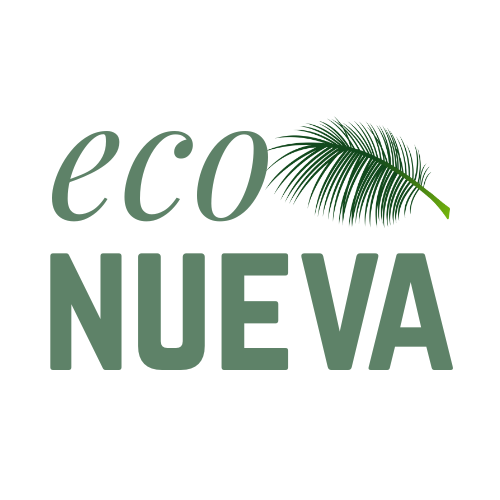Eco-Tourism In Sinai Is Egypt’s Best-Kept Secret [7 Best Eco Places In Sinai]
![Eco-Tourism In Sinai Is Egypt’s Best-Kept Secret [7 Best Eco Places In Sinai]](https://images.unsplash.com/photo-1572376069663-5f52bdd158f2?crop=entropy&cs=tinysrgb&fit=max&fm=jpg&ixid=M3wxMTc3M3wwfDF8c2VhcmNofDd8fHNpbmFpJTIwfGVufDB8fHx8MTc0OTY3MzQxMnww&ixlib=rb-4.1.0&q=80&w=2000)
There’s a quiet ecological revolution going on in the Sinai Desert. Between the mountains and the ocean, Nuweiba is becoming Egypt’s rising eco city.
It’s not a fake place built for your Instagram feed - it’s a living, breathing ecosystem of regenerators, nurturers, and builders of the land.
I'm talking about waking up to roosters, not alarms.
Plastic-free mornings in communal kitchens, where someone’s stirring tea while another chops herbs grown meters away.
A woman baking sourdough in a mud oven while her daughter chases chickens barefoot and wild. Men weaving roofs from palm fronds, not because it’s cute for tourists but because that’s how roofs are made here.
In this loud and aggressive modern world, eco-tourism in Nuweiba invites you reconnect with the mother Earth. Especially for the wild female souls, like you and me, it is a real nourishment and recharge opportunity.
Table of Content
What Is Eco-Tourism?
Why Sinai?
What Kind of Experience Can You Have In Nuweiba?
The Best 7 Eco-Tourism Spots in Nuweiba, Sinai
FAQs
Want To Join Our Farm Hopping Experience?
What Is Eco-Tourism?

Eco-tourism is a way of traveling that focuses on experiencing nature while protecting it. It encourages visitors to explore natural environments like forests, deserts, or farms in a responsible and low-impact way.
Instead of big hotels or crowded attractions, eco-tourism supports small, local communities, uses sustainable practices, and helps preserve ecosystems and cultural heritage.
The goal isn’t just to see a place, but to connect with it whether that’s by learning how locals grow food, observing wildlife without disturbing it, or simply traveling slower and more consciously.
Eco-tourism in Sinai is something entirely different. It’s a way of life that exists with or without tourists.
Here, eco-tourism is an invitation:
- To walk on mud floors made by the hands of those who live there
- To bathe in solar-heated water while your compost nourishes tomorrow’s tomatoes
- To sit down and eat food grown steps away from the table
- To participate in agro tourism in Sinai by feeding animals, harvesting herbs, or just listening to the rhythm of land-based living
Why Sinai?

Sinai is a living contradiction - wild and gentle, sacred and rugged.
It humbles you and holds you at the same time.
And eco tourism in Sinai is the rare kind that makes space for all of that contradiction. It doesn’t try to tame the land or sell you a fantasy. It invites you into a real relationship with it.
Why Sinai? Because people here aren’t hosting to impress. They’re just continuing the work; growing soil, raising animals and children, and inviting others to see that another way of living is actually possible.
You’ll find Bedouin families who still live with the land, not on top of it.
Their knowledge of herbal medicine, animal behavior, weather patterns, and food preservation isn’t in a book.
You’ll meet farmers who came here not to build businesses, but to build a new life; rooted, real, and sustainable.
You’ll sleep in spaces made of mud, palm, and stone - not because it’s trendy, but because it works. And you'll feel it: this place was not designed to impress you. It was built to last.
Eco tourism in Nuweiba doesn’t feel like "a curated experience."
It feels like a sanctuary for your nervous system, for your body, for your feminine instinct to exhale.
What Kind of Experience Can You Have In Nuweiba?

Eco-tourism in Sinai is very active. You’re not just lying by a pool while someone serves you green juice. You’re invited to participate. To feel. To get your hands in the soil.
This is the kind of travel that feeds your body, your mind, your spirit and maybe your inner child too.
- Ride a horse through the mountains at Dayet Yunis, learning how to bond, not just ride. It’s not a touristy loop, it’s a real relationship with the animal and the land.
- Camp under the stars at Al-Maghara Beach, where the night sky is untouched by light pollution and you can hear the waves in your sleep.
- Learn how to compost at Karima’s Farm Camp, turning scraps into soil and understanding how nothing in nature is ever wasted.
- Taste raw honey straight from the hive, still warm, still buzzing with desert wildflowers and medicinal plants.
- Meditate in the silence of the desert, where stillness isn’t forced, it’s everywhere, waiting for you.
- Climb a handmade rock wall in the early morning sun, built from local stone by people who live simply and love deeply.
- Cook a fire meal with herbs you just picked, barefoot, with kids running around and chickens clucking at your feet.
- Swim in coral reefs with no crowds, no boats, no sunscreen slick on the surface, just you, saltwater, and wonder.
- Hike to secret Bedouin springs with elders who’ve walked those paths for decades, sharing stories with every step.

The Best 7 Eco-Tourism Spots in Sinai
1. Karima’s Farm Camp
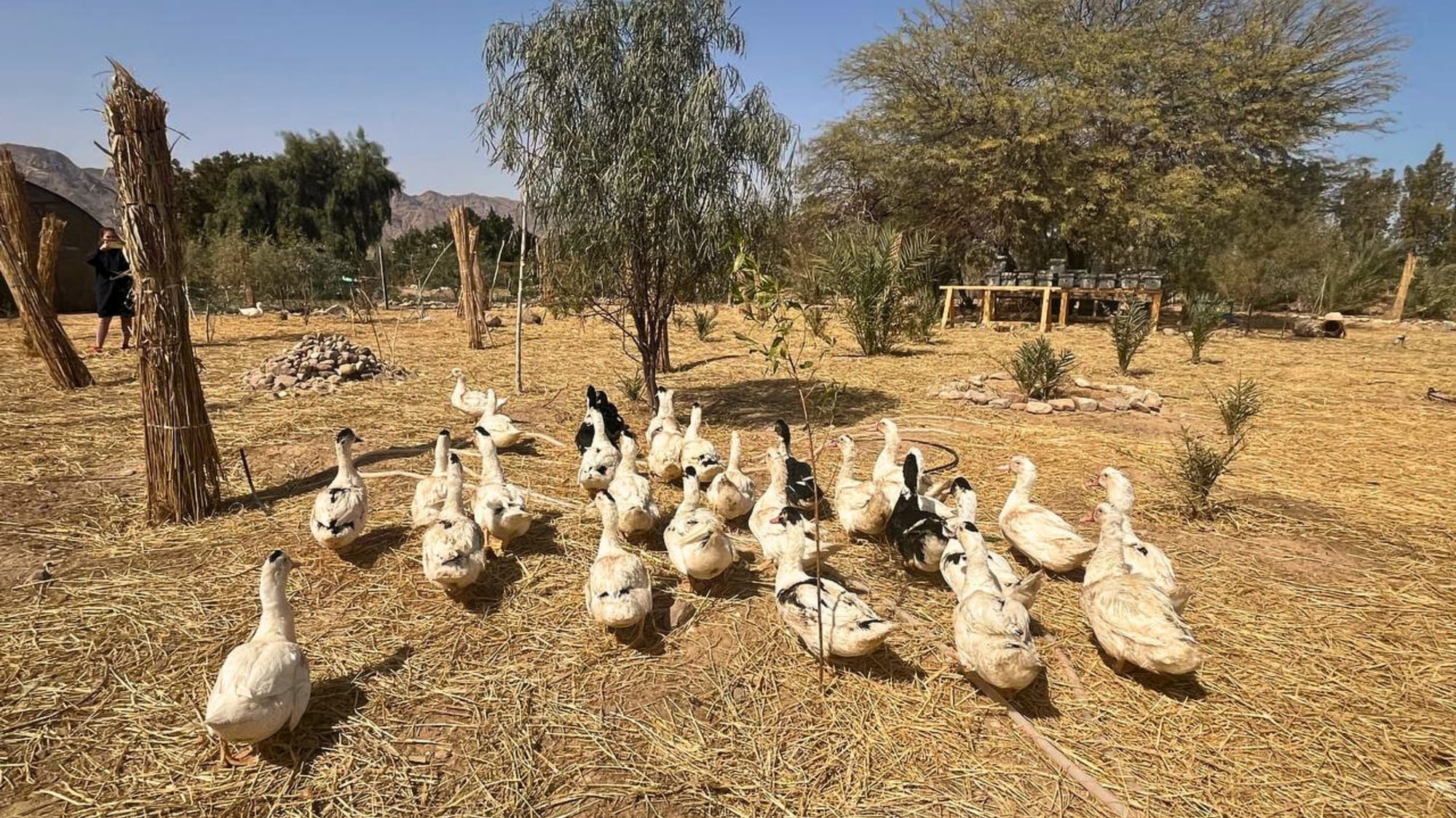
A regenerative family farm built by an international couple slowly and with love.
Here you’ll find bees, goats, ducks, compost toilets, and hammocks under the trees.
It’s not a farm-themed hotel, it’s a working farm with soul. The bee show is a hit with kids and grown-ups alike, and you can taste honey from wild desert blooms. There’s a communal kitchen, wood-burning stove, shared meals, and always a baby goat to cuddle.
Best for: Families, solo female travelers, artists, volunteers, and anyone craving real farm life. No WiFi. Just stillness, animals, and nature.
2. Dyet Younus
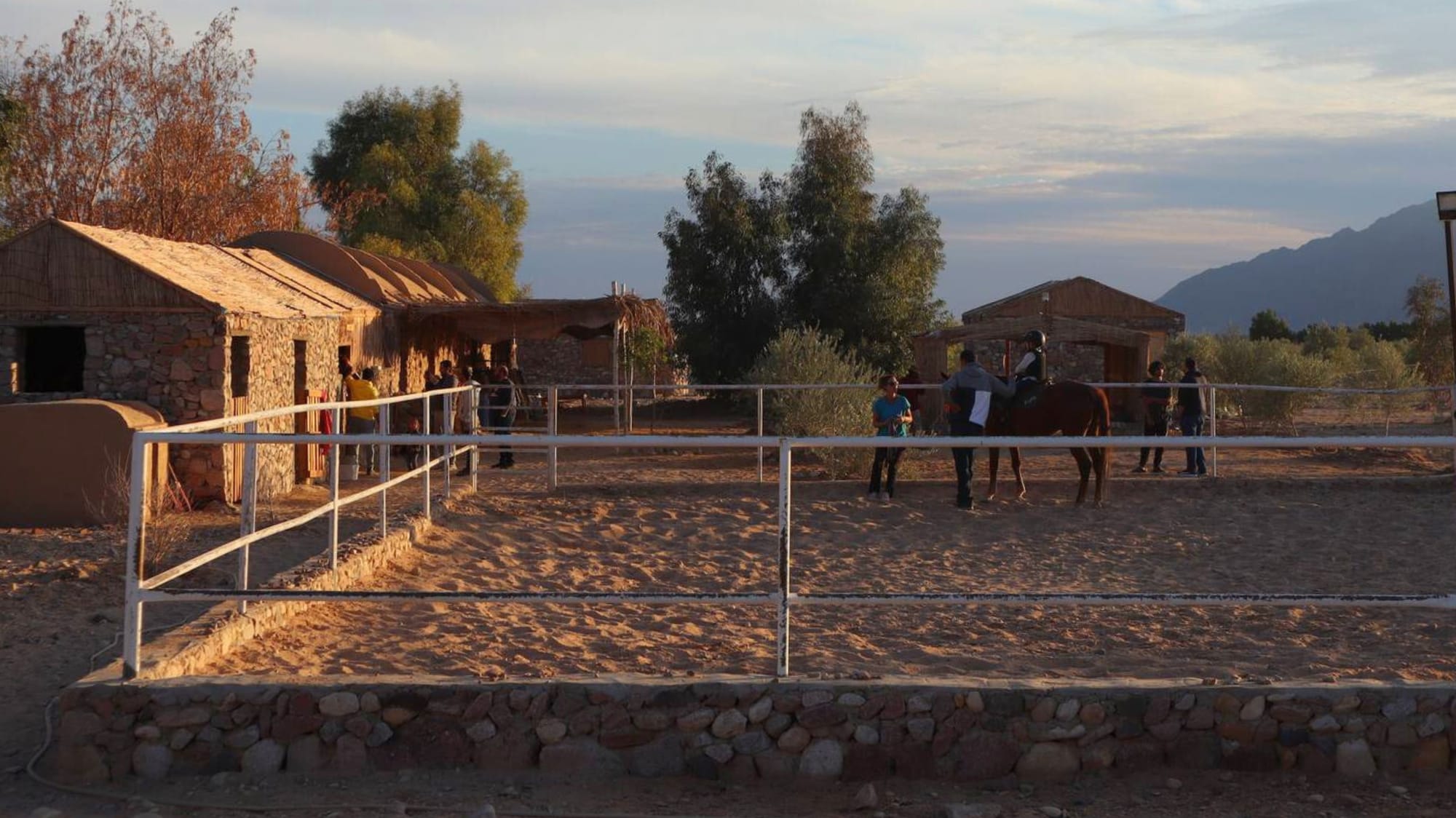
Founded by Belal, a mountain-loving horse whisperer who believes in deep connection between humans and horses. It’s a ranch-style space surrounded by cliffs, offering natural rock climbing routes, horse bonding (not just riding), and fresh farm food. The accommodations are simple wooden huts, nothing fancy but full of peace.
Best for: Adventure lovers, families with older kids, and anyone wanting to move their body and connect with animals in a deep, ethical way.
3. RockSea Camp
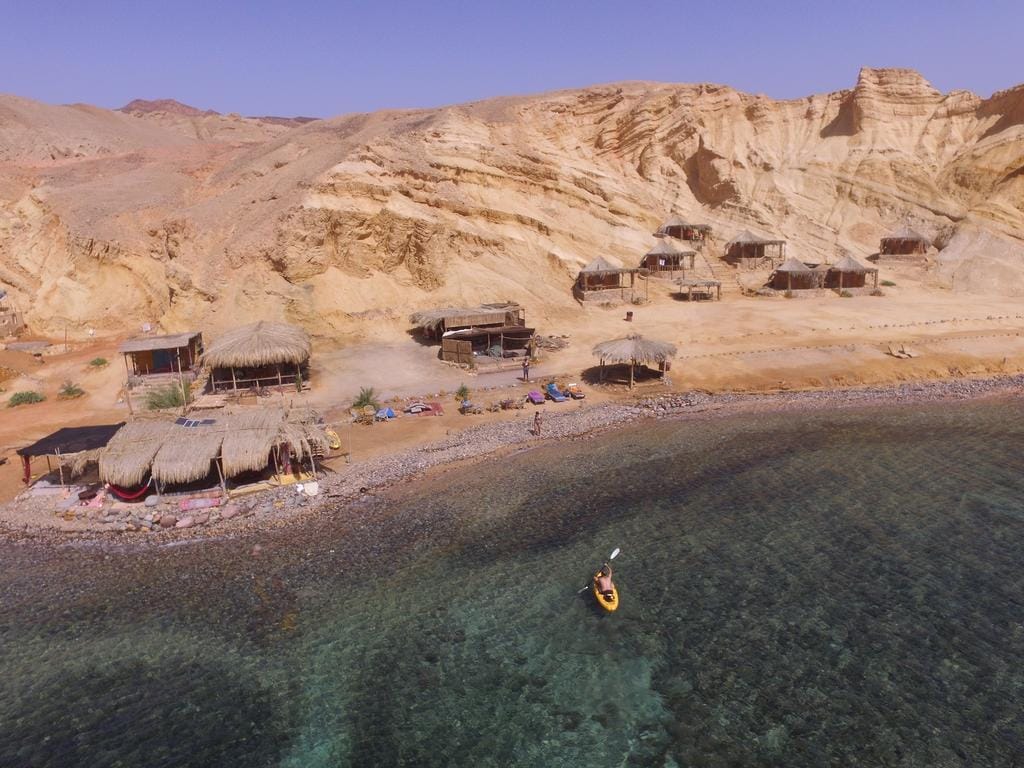
Hidden among palms just steps from the sea, RockSea Camp has jungle-meets-desert energy. You’ll sleep in bamboo huts or simple rooms with sea breeze and morning light. The vibe is earthy and international, with a big focus on sustainability and zero plastic.
Best for: Creatives, couples, and ocean lovers. Come here to swim, write, stretch, or just stare at the horizon. Not the best option for children due to the rocky beach.
4. Castle Zaman
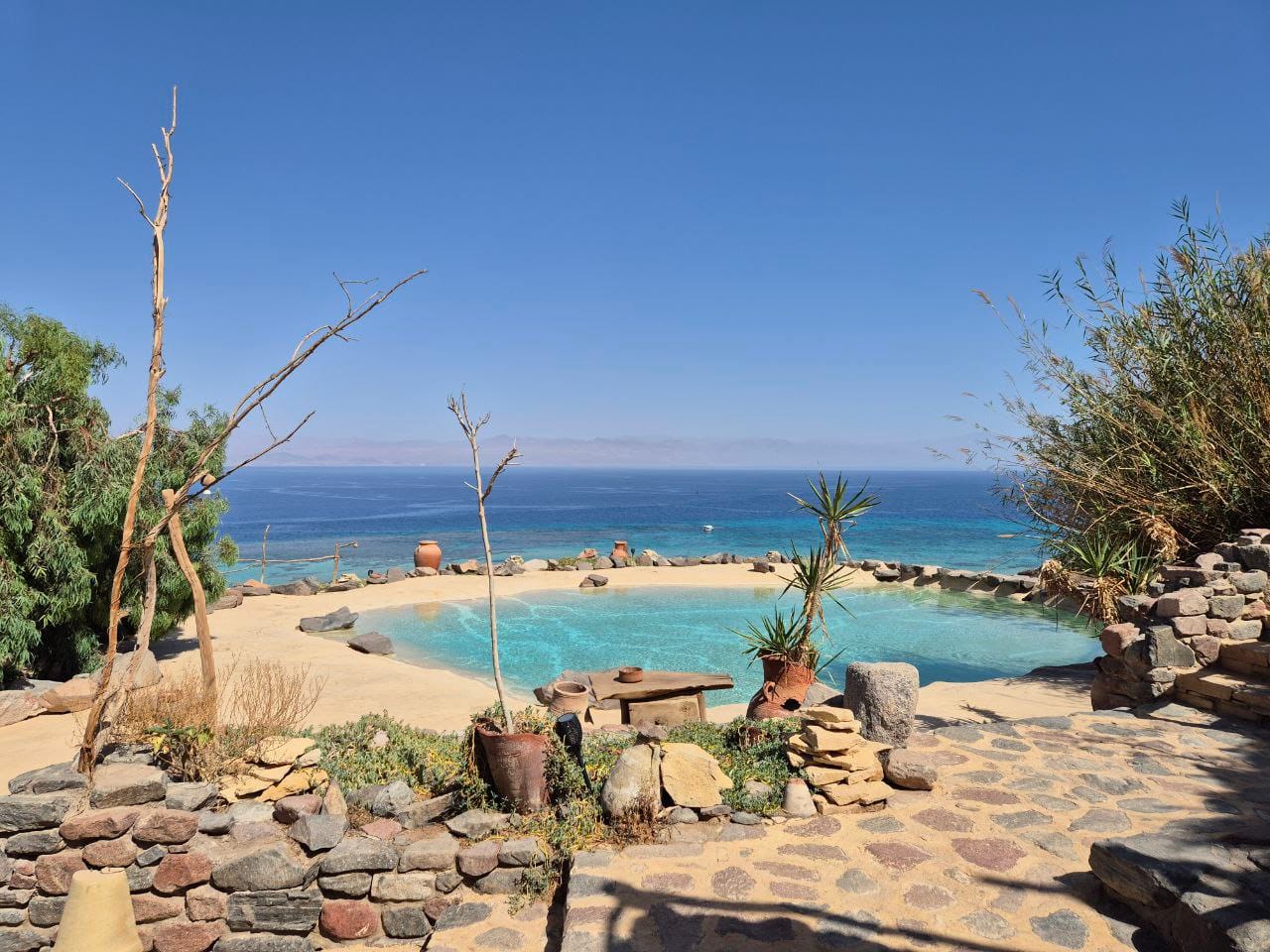
A hand-built stone castle perched above the Gulf of Aqaba. Known for its slow-cooked tagines, natural pool, and absolutely epic view. While Castle Zaman is more structured than other places on this list, its eco ethos runs deep; local stone, no waste, minimal energy use, and everything made with intention.
Best for: A day trip or romantic dinner with a view. Feels like time slows down once you walk through the gate.
5. Basata Eco Lodge
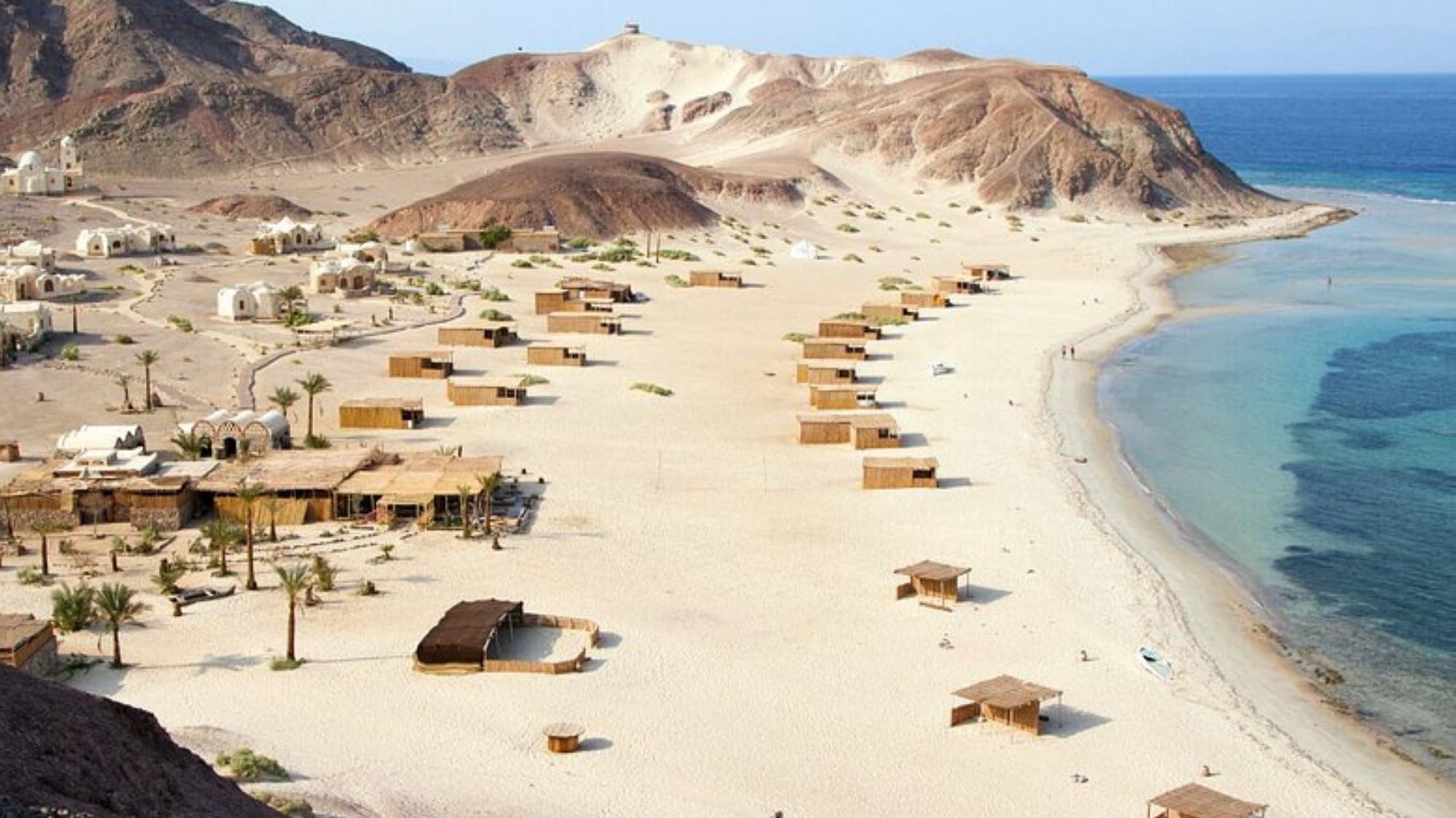
The oldest and most iconic eco lodge in Egypt, Basata Eco Lodge was founded over 35 years ago. It’s zero-waste, solar-powered, and has been plastic-free since before it was trendy.
Built with mud bricks and palm fronds, the aesthetic is simple, clean, and deeply peaceful. No music. No shoes. Just sea, silence, and slow time.
Best for: Families, solo women, long-term travelers - everyone finds something at Basata.
6. Al-Maghara Camp
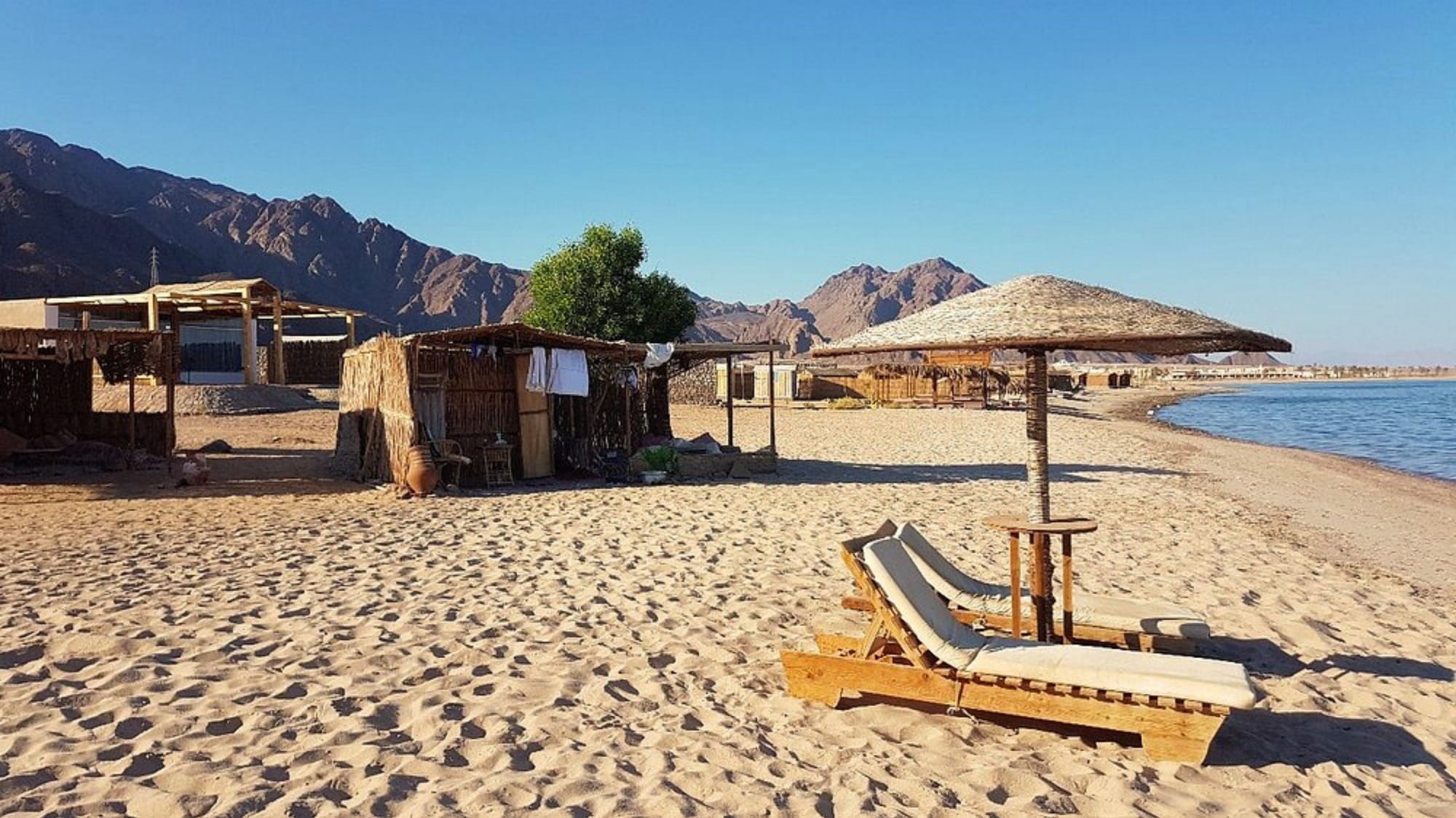
Al Magarra beach camp was created by Mishu and Rana, a local Egyptian and his Lebanese partner, who brought deep intention and warmth to every corner of the space. Rana’s food is legendary - fresh, colorful, and full of Mediterranean flavor.
There’s a long peaceful stretch of beach, family-friendly rooms, and a calm energy that’s hard to describe but easy to feel.
Best for: Slow days, family stays, and food-focused travelers looking for rest.
Note: Temporarily closed, but when it'll reopen soon.
7. Habiba Organic Farm & Beach Lodge
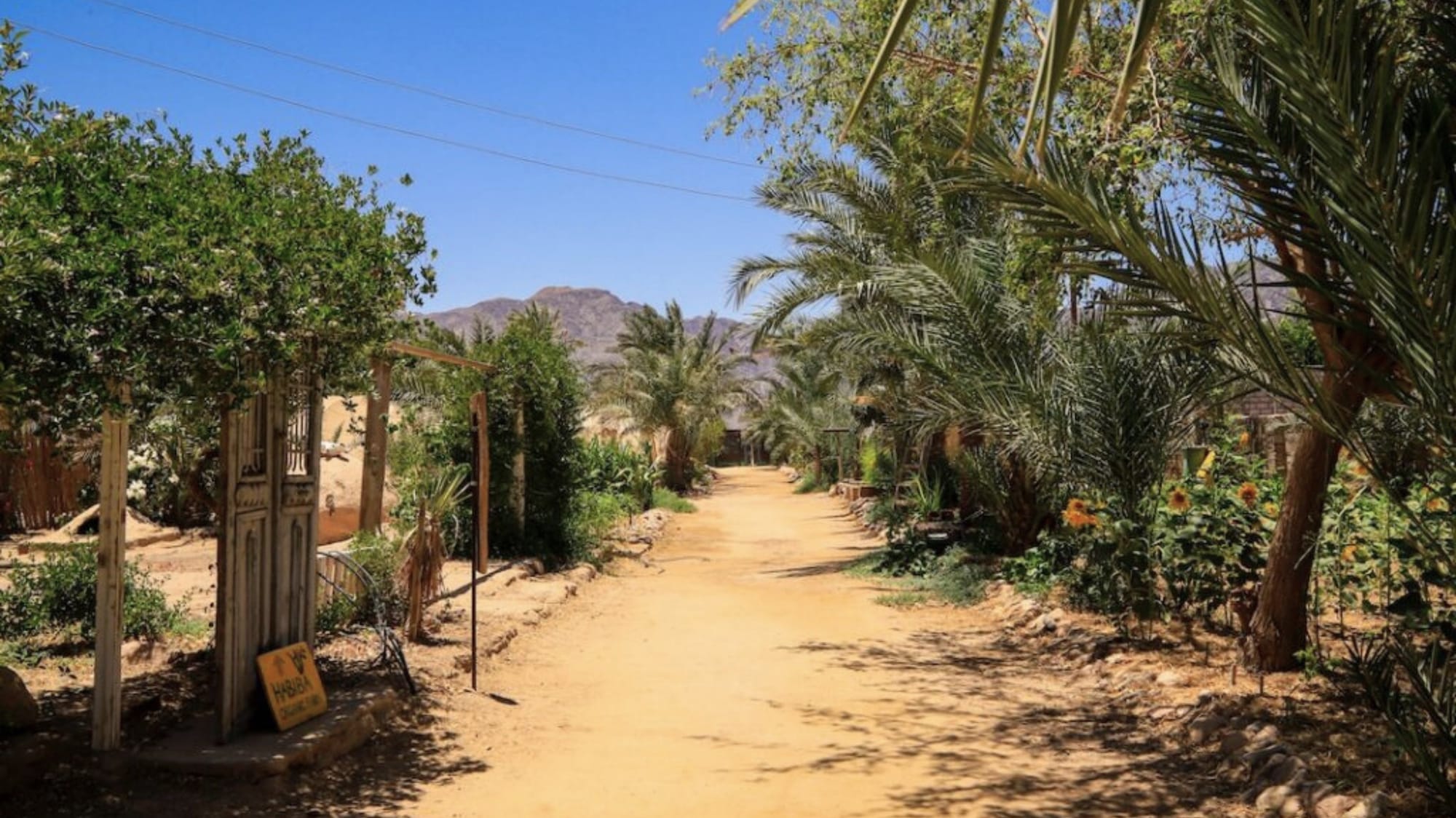
Founded by Maged and Lorena in the 1990s, Habiba is more than a farm. It’s a hub for agro tourism Sinai, education, and sustainable living.
They grow vegetables, raise animals, host international volunteers, and run an eco beach lodge just down the road. Their work with Bedouin women and children has supported the local community for decades.
Best for: To learn, volunteer, or stay near the sea while supporting something bigger than yourself.
Each of these places offers a different experience of eco tourism in Sinai, from high mountain farms to beachfront silence. Some are rough around the edges. Some are more refined. But all are real, rooted, and aligned with the land.
This Is Just the Beginning
What’s happening in Sinai isn’t a curated trend. It’s a quiet revolution. A return to what matters.
People here aren’t building escape fantasies. They’re building futures. Rooted ones. Slow ones.
Ones made of soil and saltwater, baby goats and solar panels, tea shared at sunrise, and fires lit with purpose.
If you’ve been craving something more real—something that nourishes instead of numbs—eco-tourism in Sinai is not just a trip. It’s a threshold.
And EcoNueva is the thread that ties it all together.
We’re a growing collective of farms, lodges, and eco-communities in Nuweiba offering stays, stories, and experiences that are actually sustainable—socially, spiritually, and ecologically.
Come walk with us.
Not to spectate, but to participate.
Not to escape, but to return.
Frequently Asked Questions
1. Is Egypt eco-friendly?
Egypt is making progress, but it's not fully eco-friendly yet. Big cities like Cairo still struggle with pollution and plastic waste. But in places like Sinai, especially Nuweiba and Dahab, there are strong local efforts like eco-lodges, organic farms, and zero-waste communities trying to live in harmony with nature. That’s where the real eco movement is happening.
2. Why is Sinai the best place for eco-tourism?
Because Sinai is still raw and real. It hasn’t been overbuilt or commercialized like other tourist spots. Here, you’ll find small family-run farms, off-grid beach camps, and people who live close to the land. The nature is stunning, mountains, desert, sea, and the local culture is deeply connected to it. It’s not a show. It’s a way of life.
3. Is Sinai safe for solo female travelers?
Yes, especially in places like Nuweiba and Dahab. These towns have a strong community feel, and many solo women (locals and travelers) live and explore here safely. As with any destination, dress respectfully, trust your instincts, and connect with trusted hosts. Many women say Sinai is one of the safest and most healing places they’ve visited.
4. How can I travel eco-friendly?
Travel slow, stay local, and reduce your waste. Choose small eco-stays instead of big hotels. Support local farms and crafts. Bring your own water bottle and avoid single-use plastics. Ask questions: how is the place built, how do they deal with waste? Most of all, be present and respectful. Nature will thank you.
Want To Join Our Farm Hopping Experience?
We’ve created a 3-day all-inclusive Farm Hopping Experience that takes you deep into the heart of Nuweiba’s rising eco movement.
You’ll sleep in mud huts and wooden cabins, eat food grown steps from your bed, and meet the real people regenerating the land; farmers, foragers, builders, and wild-hearted women.
This isn’t eco-tourism as a trend. It’s eco-tourism as a way of life.
If something in you is craving that reconnection with nature, this trip is made for you.
